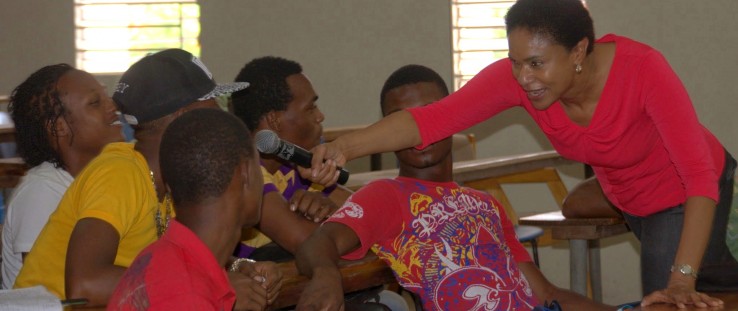 Volunteer Donna Gabbadon interacts with youth at a leadership skills seminar in 2014.
Photo courtesy of Donna Gabbadon
Volunteer Donna Gabbadon interacts with youth at a leadership skills seminar in 2014.
Photo courtesy of Donna Gabbadon
 Volunteer Donna Gabbadon interacts with youth at a leadership skills seminar in 2014.
Photo courtesy of Donna Gabbadon
Volunteer Donna Gabbadon interacts with youth at a leadership skills seminar in 2014.
Photo courtesy of Donna Gabbadon
“Life was the same old same old and not full of opportunities. Since leaving secondary school, I have been struggling to get a job,” said 20-year-old Jovan Ottey.
Unfortunately, Ottey’s situation is common, as so many other young people his age struggle every day to find work in Jamaica.
According to the Statistical Institute of Jamaica’s 2012-2013 report, 42 percent of youth between the ages of 14 and 24 are unemployed. For many of these bright young people, the ambition to pursue the entrepreneurial dream and develop their own business has been daunting, leaving them frustrated and hopeless.
“At one point I thought about opening a bakery, but that never happened,” said Ottey, who lives in the inner-city community of Mountain View, is currently the president of his youth club and is a member of the Mountain View Community Development Council.
“Because of my active involvement within my community, I would attend a lot of workshops and training sessions about how to start your own business and developing a business plan,” he said. “Even though the sessions gave me a lot of insight, they always fell short [of real help].”
In 2012, recognizing the challenge of youth unemployment and the need for strong programs to support entrepreneurship and build employability skills, USAID and Accenture partnered with Cuso International to develop the Diasporas for Development initiative. Under the program, 40 skilled professional volunteers were recruited from diaspora communities in the United States to support Cuso International’s existing programs in five countries, including Jamaica, to address some of the challenges faced by many young people.
“Persons from the diaspora community are bringing with them the benefit of working in a different context. These are persons who understand their home, but they are also bringing a fresh pair of eyes, which paves the way for innovation,” said Onyka Barrett, program manager of Cuso International Jamaica.
Donna Gabbadon was one of the diaspora volunteers who helped pave the way.
Jovan Ottey caught her eye in 2014 when he expressed his dissatisfaction at a leadership seminar. “I remember speaking loudly about my frustration about trying to develop a business plan and not reaching anywhere. I stood out.”
And stood out he did. Gabbadon, a Diaspora for Development volunteer and Jamaican by birth, heard his frustration.
“At the leadership program, Jovan was one young man who was well-motivated,” said Gabbadon.
A small business owner in Pennsylvania, Gabbadon knew she had a perfect opportunity to harness and guide Ottey’s passion to develop a business plan to start his own company. Following the seminar, Ottey and Gabbadon met regularly to strategize and develop a business plan that would better position him for the labor market.
In her four-month volunteer role, Gabbadon served as a youth entrepreneurship development adviser for the Mountain View Community Development Council. In this role she guided and motivated young people to develop, market and implement a business plan with the intention to kick start their own businesses. Prior to traveling to Jamaica, Gabbadon completed a rigorous full-day assessment and five days of training.
“The recruitment process of volunteers is very extensive, as this is a multiple partnership. Cuso, USAID, the diaspora partner organizations and the local development partners here in Jamaica are a part of the selection process,” Barrett said. “We try as best as possible to match the skill sets of the professional volunteer with the need of the youth in the communities. The reality is that the economy is at a point where, to have significant change in the labor market, there needs to be greater synergies with various actors and sectors. We cannot rely on one institution. This partnership is a demonstration of one such possible synergy.”
Making a Match
“I was excited because I thought, finally, I could now get the hands-on help that I needed to start my own business,” said Ottey, who now has a business plan for his start-up company where he will be making furniture from bamboo and targeting the tourism industry.
“I saw the opportunity to volunteer, as I wanted to get closer to the youth to help them improve, motivate and empower them, especially those who had an interest in becoming entrepreneurs,” said Gabbadon.
An additional aspect of the Diaspora for Development program has been e-volunteering, where volunteers continue to support the organizations and individuals with whom they have worked in-country through digital media such as Skype, email or social networks.
“Donna and I have our weekly business meetings via Skype, and sometimes we just talk about what’s going on in Jamaica and where she lives. She is my friend,” said Ottey.
Through Diaspora for Development, six volunteers have completed assignments in Jamaica, directly assisting more than 300 young men and women. Their work included one-on-one mentorship sessions in developing a business plan, training in marketing and empowerment workshops.
“I am encouraged by how much interest this project has drawn, not just from within Jamaica but from Jamaican communities abroad. Real and transformative development requires a commitment from the diaspora to invest their time, knowledge and resources to develop the talent of the youth that exists in Jamaica,” said USAID/Jamaica Mission Director Denise A. Herbol. “I am confident that this partnership between the diaspora and international development partners will be a significant step towards a brighter future and a more prosperous Jamaica, the place of choice to live, work, raise families and do business.”
This experience has done more than just support Jamaica’s efforts to empower its youth. The volunteers gain as well.
Gabbadon is not done with Ottey or reconnecting to her mother-country, which she left more than 30 years ago to be with her husband. “I am definitely going to come back more often, and I am coming back a wiser person. I learned a lot from Jovan and his peers, about the challenges that they face daily, which are complex and multifaceted, something that cannot be fixed with a single stroke,” said Gabbadon. “They invited me into their world and showed me how we can be more innovative in finding solutions.”
Since participating in the mentorship program and developing his business plan, Ottey entered it into a competition organized by the Diaspora Youth Connect program, the Mountain View Community Development Council and Diaspora for Development. Placing second, Ottey will receive start-up equipment for his company. He is now hopeful, and his next step is to start his company, which he plans to name Innovative Bamboo Furnishing and More.
“I just want to create a life experience and right now I am looking ahead to target investors and the wider market over the next six months,” he said.







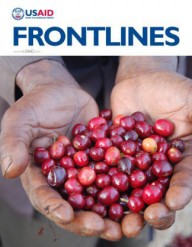

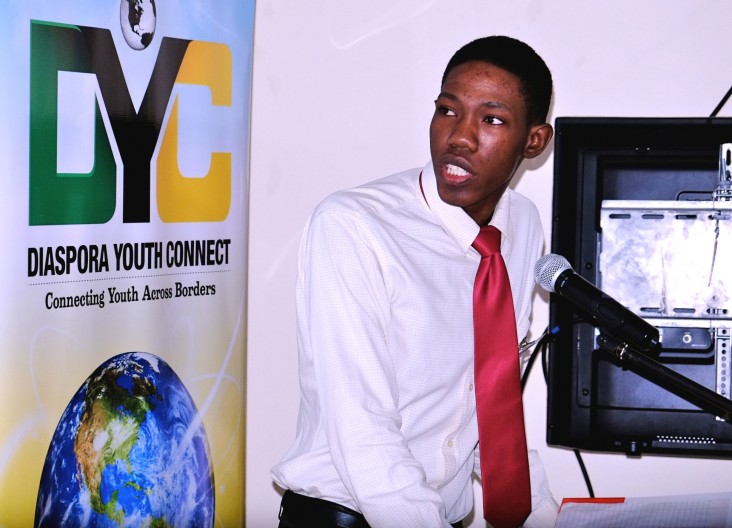

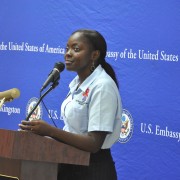
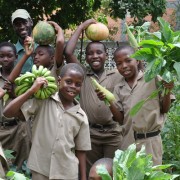
Comment
Make a general inquiry or suggest an improvement.